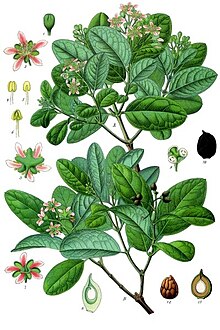Boldo
| Boldo | |
|---|---|

| |
| Scientific classification | |
| Kingdom: | Plantae |
| Clade: | Tracheophytes |
| Clade: | Angiosperms |
| Clade: | Magnoliids |
| Order: | Laurales |
| Family: | Monimiaceae |
| Genus: | Peumus Molina |
| Species: | P. boldus
|
| Binomial name | |
| Peumus boldus Molina
| |
| Synonyms | |
|
Ruizia fragrans Ruiz & Pav. | |
Peumus boldus, commonly known as boldo (from the Mapuche name foḻo), is a species of tree in the family Monimiaceae and the only species in the genus Peumus. It is endemic to the central region of Chile, between 33° and 40° southern latitude.[1][2] Boldo has also been introduced to Europe and North Africa, though it is not often seen outside botanical gardens.
Due to its common name, it is often confused with the species
Description
Boldo, together with
The edible fruits are small
Uses
In Brazil, Argentina, Chile, Uruguay, and Paraguay, boldo is mixed with
Boldo and plants with similar properties are widely used as mild
Boldo is in the family
Boldo leaves have a slightly bitter, soft flavor and a bit of a rough, coniferous taste when brewed in tea. They are used as a culinary herb to spice many savory dishes including fish, mushrooms, and vegetables and as a component in sauces. In some local South American kitchens boldo leaves are also popular for wrapping frying fish and meat. Boldo fruits, when dried, are used to make spicy condiments.[4]
Toxicity

In 2009, the European Medicines Agency assessed boldo as follows:
Boldo leaf contains the alkaloid
Most investigations have been carried out using boldine.[citation needed]
Limited information is available on herbal preparations of boldo leaf and where studies have been reported, details of the preparations are usually lacking. There are no reported genotoxicity or carcinogenicity studies with herbal preparations of boldo leaf.
Boldo oil should not be used internally or externally. Where boldo leaf is used, the total exposure to ascaridole should be considered from a safety standpoint. The levels of ascaridole in herbal medicinal products should be quantified. In view of the low solubility of ascaridole in water, the use of aqueous extracts including herbal teas could be accepted.[medical citation needed] The use of ethanolic extracts of boldo leaf is not considered acceptable for traditional herbal medicinal products, in view of the potentially higher levels of the toxic ascaridole constituent.[6]
References
- ISSN 0717-6643.
- ^ Coop, Paul. "Peumus boldus, Peumus bolod, Boldo -Western-". www.innerpath.com.au. Retrieved 2017-12-11.
- ^ ANVISA (Agência Nacional de Vigilância Sanitária). 2011 Formulario de Fitoterapicos da Farmacopeia Brasileira Archived March 23, 2014, at the Wayback Machine. Brasilia, Governo Federal do Brasil.
- ^ P N Ravindran CABI, Dec 28, 2017 The Encyclopedia of Herbs and Spices
- ^ Mariano, 2019
- ^ a b Committee on Herbal Medicinal Products (HMPC) (2009). "Assessment Report on Peumus boldus Molina, Folium" (PDF). European Medicines Agency. Doc. Ref.: EMEA/HMPC/591131/2007.
External links
- "Boldo leaves (Peumus boldus Molina)". Gernot Katzer's Spice Pages.
- "Pictures and information of Boldo tree, leaves and flowers".
- "Plantas de la flora de Chile cultivadas en España" [Chilean plants cultivated in Spain] (PDF) (in Spanish). Archived from the original (PDF) on 2009-03-20. Retrieved 2009-06-27.
